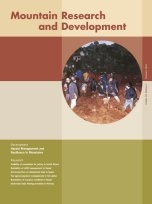In the closing months of 2003 the global Mountain Forum ( www.mountainforum.org) network underwent a significant period of organizational change largely invisible to the network's wider membership. Since 1995 The Mountain Institute (TMI), USA, has served the network as the principal architect and host of its global information services. In December 2003 TMI transferred these long-held duties to the International Centre for Integrated Mountain Development (ICIMOD), in Nepal. This quiet changing-of-the-guard marks the conclusion of TMI's implementing role in the network—an event TMI celebrates both as an act of capacity building and of service to the wider global mountain community. What follows is a brief account of TMI's role in the Mountain Forum's evolution, and a vote of confidence in its new stewards at ICIMOD to carry it well into the future.
Soon after mountains gained global recognition at the 1992 Earth Summit in Rio de Janeiro, the Food and Agriculture Organization of the United Nations (FAO) broadened participation in the official follow-up activities for the Mountain Chapter of Agenda 21 by including NGO representatives in an Ad Hoc Inter-Agency Group. This act paved the way for TMI and many other organizations to become more actively involved in networking for sustainable mountain development.
In late 1994 TMI was asked by FAO and the government of Switzerland to organize an International Consultation on the Mountain Agenda in Lima, Peru, an event designed to frame policy recommendations for sustainable mountain development. 1994 also saw the formation of regional mountain networks in Asia and Latin America hosted by ICIMOD in Kathmandu and by the International Potato Centre (CIP/CONDESAN) in Lima, Peru. The concept of linking existing and future mountain networks in a global network of networks gained widespread support from participants at the Lima consultation. The enthusiasm for the creation of such a network was borne by the simple but powerful desire amongst a diverse, often separated group to have a means of remaining connected.
The Lima consultation and subsequent workshops led to the formation of the Mountain Forum—a global communication network for people who support mountain communities, environments, and sustainable development. TMI was honored to accept the mandate to establish this network and began to cooperate with regional mountain networks, recruit global membership, set up web pages and discussion lists, open an online library, maintain a calendar of events, and provide support to mountain events and the United Nations.
The evolution of the Mountain Forum in the mid-to-late 1990s parallels the rise of the Internet. The network was one of the first designed specifically to utilize information communications technologies (ICTs) for development. TMI worked with regional partners to pioneer the Mountain Forum's models and methodologies for conducting global electronic conferences and consultations, often on themes linked to prominent issues at the United Nations.
Despite the Internet's remarkable expansion, the digital divide—limited access to ICTs for many, especially remote and marginalized groups—continues to remain a challenge. The Mountain Forum places great emphasis on the need to design accessible, simply presented but content-rich, low-bandwidth information services, supplemented by printed materials and face-to-face meetings whenever feasible.
In addition to participation by members and subscribers around the world, which has been the lifeblood of the network, many donors and partners have contributed to the success of the network. The key donor throughout the life of the Mountain Forum has been the Swiss Agency for Development and Cooperation. Their commitment to the endeavor has sustained it from its earliest conceptual stages.
As the Mountain Forum has grown, its needs and services have changed. TMI's original role as incubator of this interesting network evolved gradually into the role of trainer and capacity builder. In 2000 the Mountain Forum Secretariat was established at ICIMOD, and at the May 2003 board meeting of the Mountain Forum, the decision was finalized to fully transfer the global information services to ICIMOD, in order to integrate them into the Secretariat and operate them from a developing country. This decision was promoted and embraced by TMI, which as a development NGO views capacity building and strengthening partnerships as central to its mission.
During the fall of 2003, TMI began the handover of the Mountain Forum's global information services to the newly expanded Mountain Forum Secretariat in Nepal. Layton Montgomery, the new Executive Secretary of the Mountain Forum, and Dr. Gabriel Campbell, Director General of ICIMOD and the Mountain Forum Board Chairman, have recruited an outstanding international team of experts to manage the global information services. This talented new team worked closely with TMI staff in the last three months of 2003 in what thus far has been a seamless transfer. TMI wishes to express our deepest thanks and good wishes to all who have made, and continue to make, the Mountain Forum a success through their participation. A splendid new era of growth and service for the network is at hand!
Participants of the MF GISN transfer workshop in October 2003, at TMI's Spruce Knob Mountain Center, Appalachian mountains, West Virgina, USA. Top row, left to right: Layton Montgomery (ICIMOD), Douglas Wandersee (TMI), Sani Malam Karami, Jason Espie (TMI). Bottom row, left to right: Grace Werner (TMI), Agustina Barros (ICIMOD), Elizabeth Byers (TMI), Prashant Sharma (ICIMOD), Dan O'Brien (TMI). (Photo courtesy of TMI)






